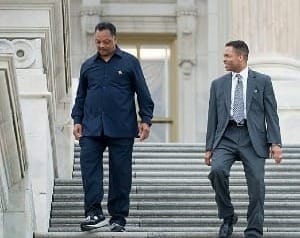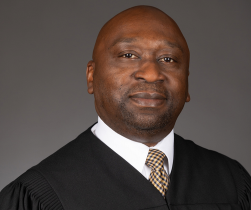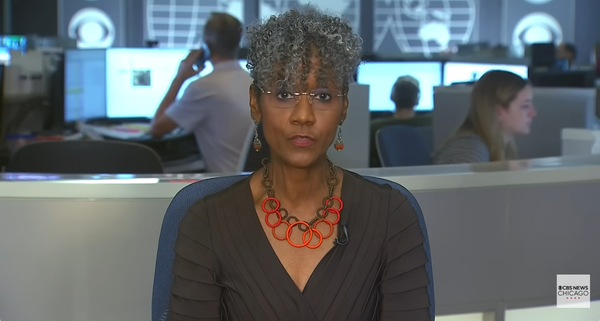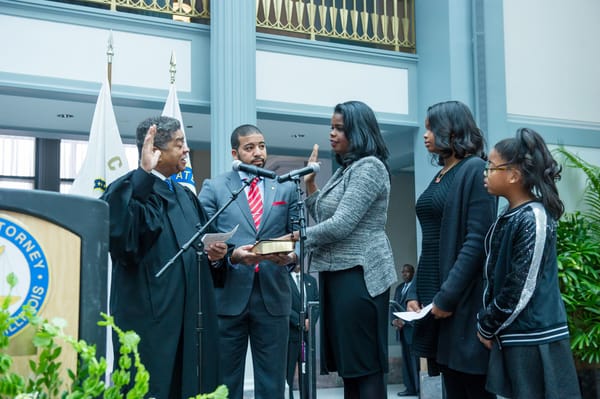'Use your legal power to vacate convictions,' Chicago moms say voicing UN mandate
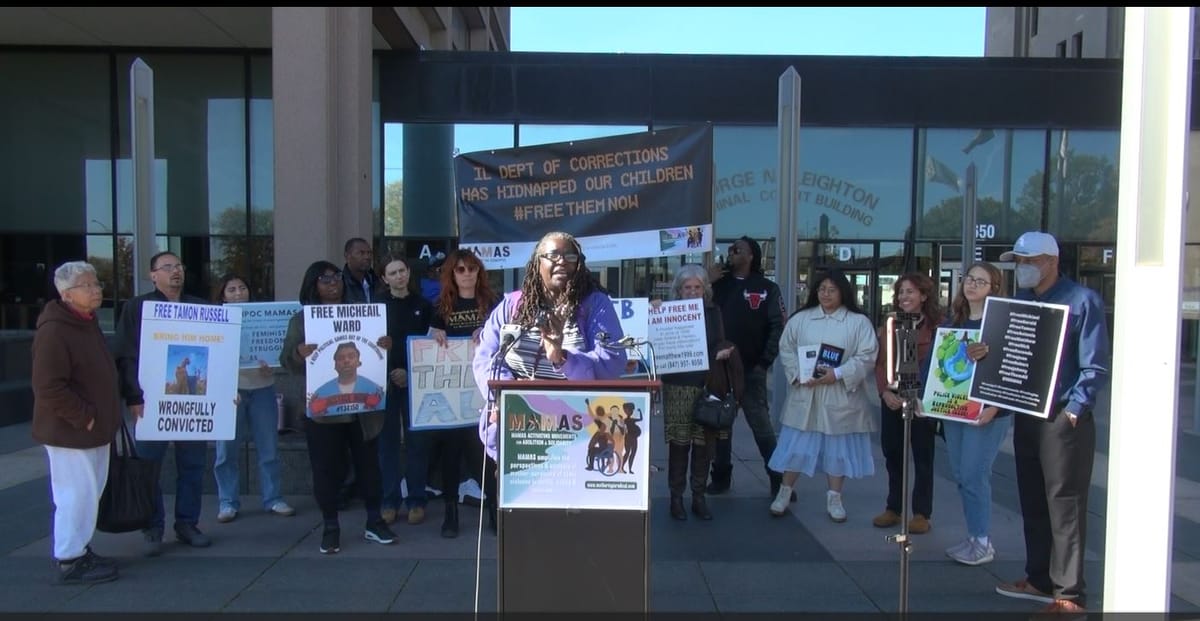
Moms of adult children often lament that their sons and daughters don't call home frequently enough. But that's not the issue for Denise Spencer, who says there have been times when her son has called her as many as ten times a day.
Spencer's son, Michael has been incarcerated for more than two decades at a prison 230 miles south of Chicago for a crime his family says he didn't commit. At first, Spencer didn't get why her son, who was arrested at 19, calls her so often. But now she says understands.
"It took time for me to realize that's his moment to get away from the madness," Spencer said. "That 20 minutes is like a lifeline to him to just sit there and talk to me and find out what's going on at home and what the outside world is doing to bring his mind from where he's caged and locked up."
Spencer shared this story Thursday as a member of Mothers of the Kidnapped, a Chicago collective of MAMAS Activating Movements for Abolition and Solidarity, who advocate for their sons and daughters convicted of crimes after police used torture to extract confessions or coerced eyewitnesses into providing incriminating statements.
"Every time I have to come back to this horrible building, it's painful and it retraumatizes," Spencer said on the steps of the George N. Leighton Criminal Courthouse, a building Spencer has visited regularly since 1999 for hearings on her son's case.
The mothers are asking state and county officials to respond to a 26-page mandate from five UN experts who have asked the Illinois governor, attorney general along with the Cook County state's attorney to provide insight on the remedies the state has implemented in response to the city's documented history of police torture, which has resulted in hundreds of people spending decades behind bars for crimes they didn't commit.
Implicated officers reportedly used different methods of torture and ill treatment, including verbal abuse and insults; an electrocution machine that they would connect to fingers, genitals, gums, earlobes; mock executions; threats to cut off toes; punching; choking; kicking; slapping; suffocating; beatings with phone books; beatings with flashlights; pulling hair out of the scalp; locking individuals in cold storerooms for extended periods of time; threats to throw individuals out of windows; dragging individuals up and down staircases; withholding access to food and water; burning individuals with cigarettes; waterboarding; and/or denial of medical attention. This abuse would typically include racial and derogatory slurs, most commonly the use of the N-word.
Operating under mandates to report and advise on human rights from a thematic or country-specific perspective, the experts, who the UN calls special rapporteurs, also researched Chicago's practices and policies on racism, racial injustice and physical and mental health. They produced their report after several visits to the city, expressing disappointment by what they found.
"Following her 2023 visit to the United States of America the Special Rapporteur on contemporary forms of racism, racial discrimination xenophobia and related intolerance stated she was "appalled at the dehumanizing racial discrimination within law enforcement and at every stage of the criminal justice system particularly impacting Black, Arab, Islamic indigenous and Latino individuals," they wrote in the May 20, 2024 report.
Capital of Wrongful Convictions
With 253 vacated convictions over the past eight years, Illinois has exonerated more people than any other state thereby earning the dubious distinction of wrongful conviction capital of the country. Cook County State's Attorney Kim Foxx has said that these exonerations have just scratched the surface on the number of people wrongly convicted throughout the state.
Based upon the existing documented evidence of torture and denial of constitutional rights during police interrogations along with the dearth of evidence linking their children to the crimes to which they confessed, the moms have asked Foxx to vacate their convictions and bring their children home. They also have filed petitions for clemency and pardon with Illinois Governor J.B. Pritzker.
Toward gaining more support for their efforts, four years ago the moms sought international help. They began a dialogue with the UN special rapporteur on torture, sharing their stories and the challenges they are experiencing in pursuit of getting their children home.
The UN mandate advises Illinois powers-that-be that police torture violates internal convention against torture which advises that "prosecutors and courts have a duty to refuse evidence obtained, or suspected of having been obtained, through torture or other illicit means."
With 12 action items they tasked Illinois to provide an answer on how the state is responding to racial profiling in policing, criminal cases built on false confessions, false information and constitutional violations as well as lack of access to justice and remedies for the wrongly convicted.
"Please provide information on what measures have been taken to prevent future incidents of torture or other ill treatment or unlawful conduct, including to prevent the obtainment of confessions or information by unlawful means," they wrote,
They also asked for an update on the status of two dozen people with pending post-conviction cases that they hope will lead to exonerations, including Spencer's son, and inquired about the availability of psychosocial support for torture victims upon release from prison.
At the press conference, Spencer and other speakers shared the impact the city's inaction has had on the mothers and family members of torture victims.
"Their mothers and their loved ones have been emotionally tortured and harmed physically and economically along with them," said Nadine Naber, MAMAS research director and gender and women's studies professor at UIC at the press conference.
"The corruption in our courts make it impossible to get their wrongfully convicted sons out and home. Nearly every court date even with all of the evidence of torture in place a judge tells them 'Come back later,' over and over for years like these individual's lives and hearts don't matter."
Naber read some of their names, the lengthy sentences that keep them behind bars and the physical and mental abuses they have suffered from the time they were arrested to lack of adequate healthcare during their incarceration to exposure to COVID-19 due to overcrowded conditions inside Illinois prison. In 2020, Illinois prisons were cited as the locations of some of the largest coronavirus outbreaks in the United States.
Noting that the mothers and their children have been fighting these cases for decades, the UN reminded Illinois that without action some would die in prison.
Despite delivering the report to Foxx, Pritzker and Attorney General Kwame Raoul, Naber says that no one has yet reached out with a response.
"They are failing the people, that they are elected to serve – both by failing to deliver justice and by failing to measure up to international standards of decency and repair," Erica Bentley, co-director of MAMAS said.
Rather than continue asking torture victims to participate in post-conviction hearings in front of the same legal community that put them behind bars, the UN suggested that Illinois leaders use their power to resolve these claims.
"Please indicate whether your Excellency’s Government has considered application of the Governor of Cook County’s and/or President’s pardoning powers to cases in which there is credible evidence of the involvement of officers who have engaged in corrupt practices, torture and/or ill treatment, given that egregious police misconduct is a matter of public record and that many were convicted on the basis of the work of Chicago Police Department officers," the experts wrote.
The case against Michael Carter began in 1999 when he returned home during a break from classes at a historically Black university in Arkansas where he had received a scholarship to pursue studies in technology and mathematics.
During Carter’s interrogation, he was denied sleep, water, food, access to the bathroom, and a phone call. He was beaten, kicked, spit on, called racial slurs and threatened during the interrogation. When Spencer arrived at the police station and heard his screams, police sent her away advising that she would be charged with obstruction of justice.
Instead of sending her son back to college, Spencer says she saw him "get snatched" from her home and enter the carceral system for something he says he didn't do. In his pursuit of innocence Carter has filed a post-conviction appeal. He also has filed for clemency.
"These UN mandates talk about providing torture survivors legal remedies – use your powers of pardon, your powers of clemency, your powers to drop charges and vacate convictions," Spencer said.
Watch Denise Spencer's full remarks.
